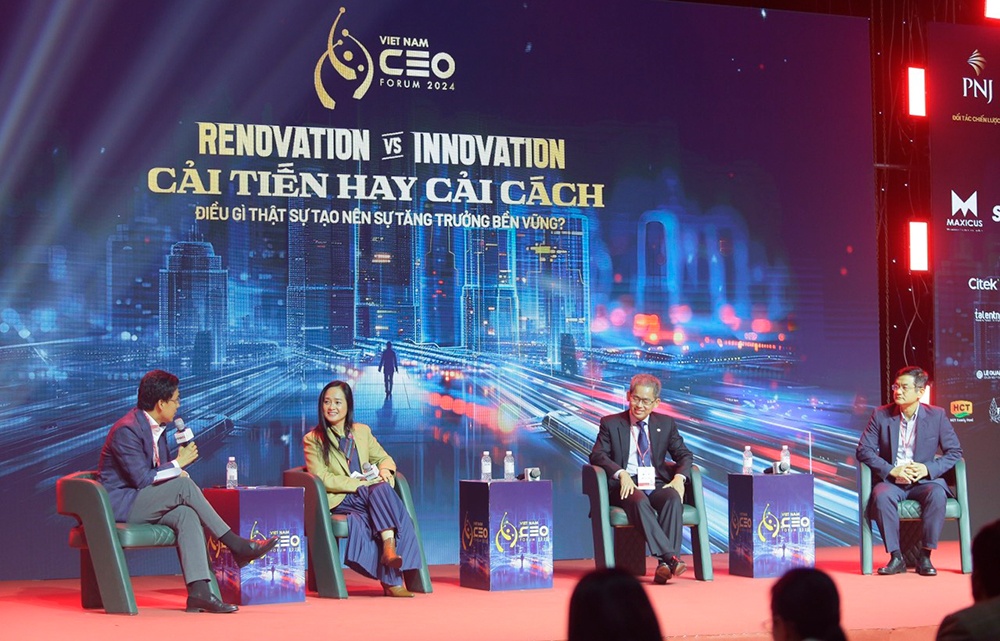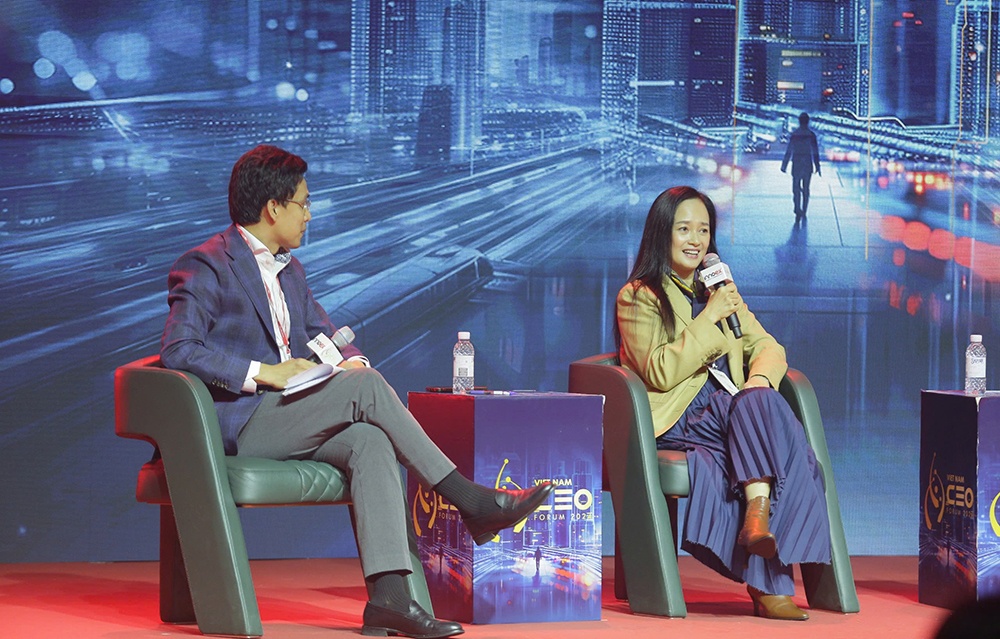Business breakthroughs made through innovation and renovation
On August 22, the Ho Chi Minh City Young Business Association (YBA HCM) held the Vietnam CEO Forum 2024, which attracted the participation of more than 1,000 business leaders.
 |
It was the 10th annual forum since 2012, formed based on the actual needs of CEOs in the process of leading their enterprises, including the need to make strategic decisions, the need for successful integration, and the need to become an enterprise with a regional and global focus.
Speakers also presented trends and the speed of change in the world, and how to apply innovation and reform to suit Vietnamese and Southeast Asian enterprises, as well as the challenges they are about to face.
The business community, leaders, and CEOs shared stories about transformation and evolution, and the ability to choose the right path in a volatile business environment.
The PAN Group was one such group represented at the forum, as one of the top companies in the agricultural sector in Vietnam. Although it was established 13 years ago, the group's subsidiaries have been established for as long as 50 years. The company's specific field of operation is expansive, from agriculture to aquaculture and confectionery.
Nguyen Thi Tra My, co-founder & Group CEO of The PAN Group, shared a story about the process of restructuring the business through innovation and renovation.
“The predecessor of the company was PAN Pacific, which was established in 1998, listed in 2008, and operated in the industrial cleaning sector. We restructured it to move it away from no longer doing industrial cleaning business. We worked with a reputable Japanese partner to sell 80 per cent of its shares, using that money to invest in the agricultural and food sectors,” Tra My said.
 |
Then came the process of M&A deals in 2012-2019, including the acquisition of Aquatex Bentre, Nha Trang Seafood 584 JSC, and Lafooco Cashew Nut Production Company. After being merged and acquired by PAN, the business of these companies recovered and developed rapidly, contributing to making the group become one of the leading agricultural companies in Vietnam.
The PAN Group is currently the biggest in the seed production industry, the second-largest in pesticides and agricultural chemicals, and third in shrimp exports. PAN's export products are now present in 40 countries and territories.
“To date, we are proud of successful innovation at the group, although in the process we have experienced many challenges. But for us, success is not the destination but the path we take, the lessons and experiences accumulated to move towards additional success,” Tra My added.
In a country where agriculture is considered the pillar of the economy, the factor that the company pays attention to first is the quality of the product. The current difficulty is how to improve rice varieties and the production process so that it can increase productivity, reduce product costs, and have high-value export products.
Therefore, like other corporations, The PAN Group spends time researching new rice varieties. After more than 20 years of looking for new rice varieties, researcher Bach Thi Vung and her colleagues found a jewel called Dai Thom, a high-quality rice variety that has been used in one-third of the rice cultivation area in the Mekong Delta region.
In the fourth quarter of this year, PAN will launch a new improved rice variety with even more outstanding characteristics in terms of drought and salinity tolerance and delicious quality rice, suitable for all climate conditions of the nation, especially the harsh summer-autumn crop in the north.
The government's aim to have one million hectares of high-quality rice was a major reform for the sector, completely changing the method of rice production and cultivation. The PAN Group is participating in and implementing farmer linkage areas, combining improvements in varieties and farming techniques to achieve the goals of the project.
“The PAN's success does not come from absolutely removing the old business activities, but to gradually change to ensure growth. Completely changing a new business model will make businesses face risks,” Tra My explained. “We have to change step by step to gradually find the market, carry out marketing, and build a sustainable brand. After some time, the rate of value-added products will gradually increase.”
During the innovation and renovation process, the role of the leader is essential because the transition process is extremely complicated, requiring that the leader must be consistent with the set goals and can motivate employees, Tra My added.
“In addition, agriculture is a difficult and risky industry, which means we cannot control natural factors such as climate change and salinity. Thus, leaders of agricultural companies are always in a startup state and must consider innovation and creativity as a priority,” she said.
Le Tri Thong, vice chairman of the Board of Directors and general director of Phu Nhuan Jewelry JSC, chairman of the YBA HCM, analysed that after a period of rapid development thanks to the advantage of cheap labour, resources, and investment stimulus policies, developing countries will face a middle-income trap.
“By 2050, Vietnam will become a developed, high-income country with an economy operating in the form of a digital economy, green economy, circular economy; in which science, technology, and innovation are the main growth drivers. To achieve these development goals and overcome the middle-income trap, Vietnam and businesses must seek new growth models where added value based on creativity is the foundation,” Thong said.
“Businesses need to look for a new model where added value is higher, and values are created from creativity and innovation, especially imagination and creativity,” he added.
What the stars mean:
★ Poor ★ ★ Promising ★★★ Good ★★★★ Very good ★★★★★ Exceptional
 Tag:
Tag:
Related Contents
Latest News
More News
- Masan Consumer names new deputy CEO to drive foods and beverages growth (February 23, 2026 | 20:52)
- Myriad risks ahead, but ones Vietnam can confront (February 20, 2026 | 15:02)
- Vietnam making the leap into AI and semiconductors (February 20, 2026 | 09:37)
- Funding must be activated for semiconductor success (February 20, 2026 | 09:20)
- Resilience as new benchmark for smarter infrastructure (February 19, 2026 | 20:35)
- A golden time to shine within ASEAN (February 19, 2026 | 20:22)
- Vietnam’s pivotal year for advancing sustainability (February 19, 2026 | 08:44)
- Strengthening the core role of industry and trade (February 19, 2026 | 08:35)
- Future orientations for healthcare improvements (February 19, 2026 | 08:29)
- Infrastructure orientations suitable for a new chapter (February 19, 2026 | 08:15)




















 Mobile Version
Mobile Version